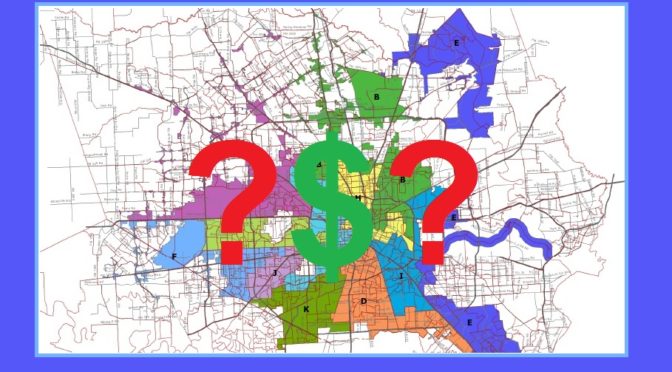After years of discussion and, failed attempts, and being a central focus of the last Mayoral election, Mayor Turner has likely decided that now is not the time to ask voters to repeal Houston’s self-imposed Revenue Cap. As Rebecca Elliot of the Houston Chronicle reports, the surprise is a bit more complicated than your normal political flip-flop…
Mayor Sylvester Turner abruptly reversed course Wednesday on his plan to ask voters to repeal Houston’s revenue cap this fall, saying it now is “unlikely” he will ask for its removal.
The politically cautious move would leave the city fiscally shackled in the hope that a lighter November ballot improves the chances voters sign off on hundreds of millions in general improvement bonds and $1 billion in pension obligation bonds, a crucial piece of the mayor’s landmark pension reform package.
“Do I believe that the needs are as much there to remove it as they were when I came into office? Absolutely,” Turner said. “Do I want to run the risk of losing the reforms that we’ve made to our pension system? No.”
[…]
Turner’s about-face came during a City Council discussion of how the cap, which has cost the city an estimated $220 million in revenue since 2014, likely will force the city to scale back the street and drainage projects budgeted in its five-year Capital Improvement Plan, or CIP.
The decision came as a surprise in part because of Turner’s regular and consistent comments on why the repeal is needed. Since before he took office, the Mayor has worked diligently to explain to Houstonians why the cap must be repealed. In fact many would interpret the ballot initiative as ‘top of the agenda’ after the state legislature passed Houston’s Pension solution and it was signed into law by Governor Abbott in May.
https://soundcloud.com/houstonmatters/repealing-citys-revenue-cap-super-bowl-committee-reimburse-houston-the-good-bad-and-ugly
But as we discussed on this week’s Houston Matters panel, the decision to spare voters this Fall likely has as much to do with politics as anything else. Since January, the Republican political establishment have used the planned repeal as an organizing tool for the party, in hopes to defeat Turner in 2019. Here’s an excerpt from the Big Jolly Politics site, written by Republican strategist Phillip Owens…
Many pundits are still trying to figure out what happened to the Republicans in Harris County in 2016. But 2017 creates opportunities for Republicans to grow the party and build for 2018 and beyond. I will focus on opportunities unique to Harris County in a series of articles, but for now let’s take a look at Mayor Turner’s promised efforts to repeal Houston’s Revenue Cap.
[…]
His statement could hold a few clues in how he might try to sway Houston’s voters to trust the City with more of your money. We’ve heard this all before when elected officials want to raise your taxes. They make promises to “fix the flooding” and our streets, they offer better and more “public transportation,” and of course there’s the never-ending promise for more improvements to city parks.
But this gives Republicans a chance to mimic the Mayor’s claim that all these problems are going to be fixed with more revenue. We should be asking a few questions, frequently, publicly and with lots of volume. Wasn’t the so called “drainage fee” supposed to fix the flooding? What is Metro doing with half of the City’s sales tax revenue? Is Metro not providing quality transportation? Do we need more empty double busses running all hours of the day? Aren’t we already using $100 million of TIRZ revenues, that had had their revenue cap lifted years ago, to “fix” Memorial Park?
Well… it’s an interesting interpretation of what Houston municipal leaders are doing with the tax revenues they collect. Perhaps Mr. Jones doesn’t ride METRO and hasn’t noticed that they appear to be putting our tax dollars to good use, especially in the wake of significant ridership increases after the system’s 2015 Reimagining. Those “half-empty buses” are steadily becoming a thing of the past.
Much of the same can be said for the City Houston, whose budgets during the Parker era saw some of the most innovative and cost effective budgets, in large part to stem the pain from the looming revenue cap.
But at the end of the day, the issue of Houston’s lost revenue may be delayed, but it’s not going away any time soon. At some point, the question will have to be asked if a modest increase in taxes (an average of $12.27 per property owner) is worth keeping police on the streets and critical services for one of the nation’s fastest growing urban areas.

